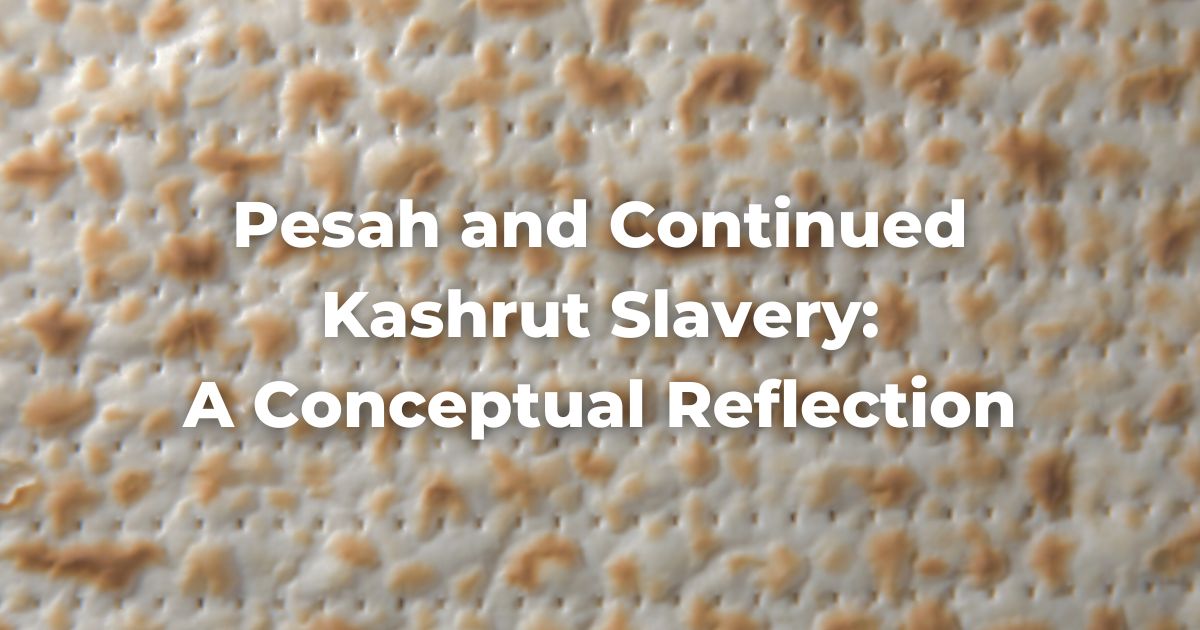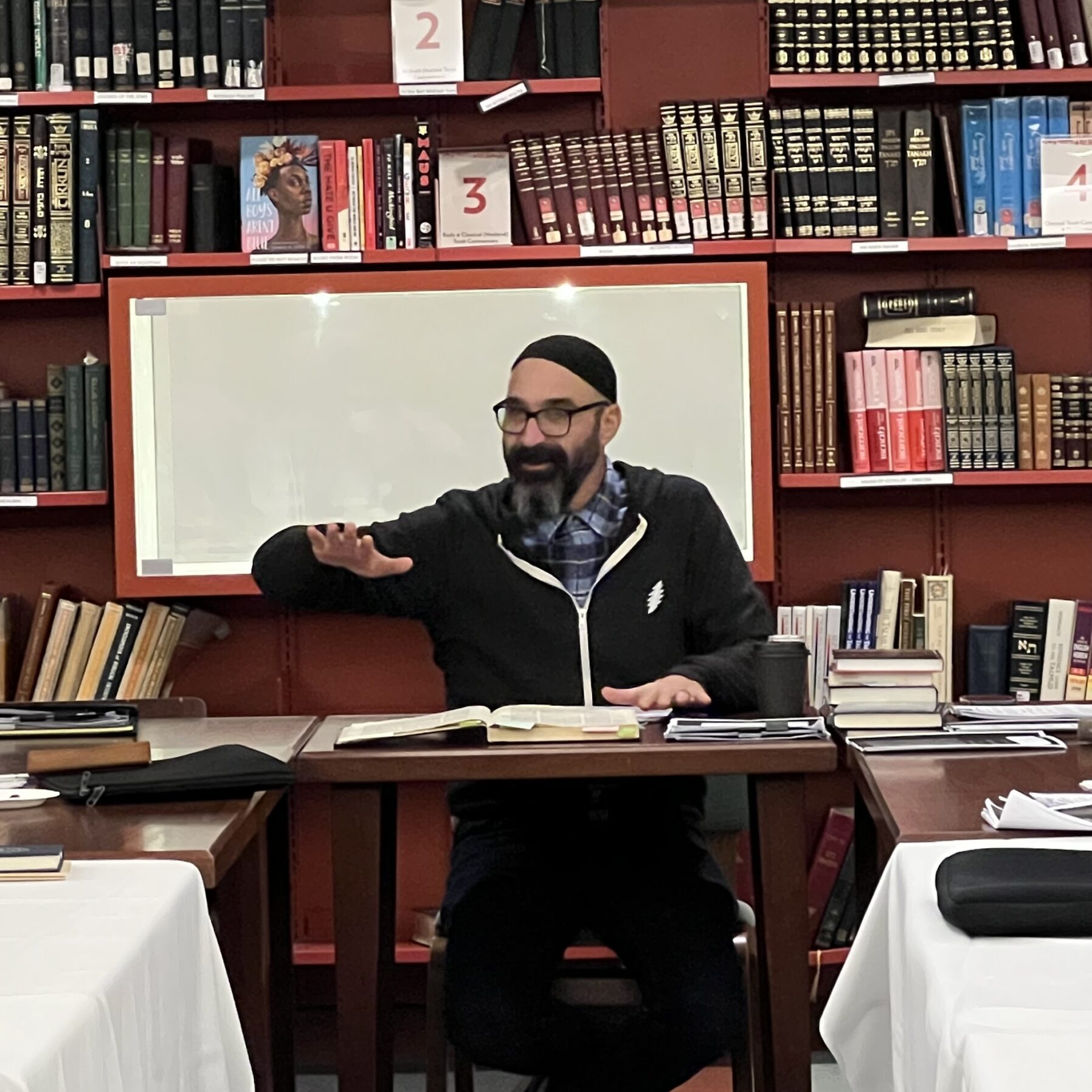Note: If you have specific questions regarding what is permitted or forbidden on Pesah please consult your rabbi.
I love Pesah and find it a very liberating time of year, as it should be. But the pre-Pesah period also usually pushes me to my limits.
(See more: EJ’s Pre-Passover Checklist)
I don’t love that people go insane cleaning and purging, far beyond what our classical texts mandate. But I also don’t want to complain too much, as I am often moved by how seriously Jews pursue their ritualistic religious identities for even this small portion of the year.
My ax to grind, however, is with rabbis. Mostly it comes down to one simple phrase, uttered all too often without any real understanding of how impactful it is to the people who listen to them:
“It’s Pesah, so we are more strict than usual [with laws around what food we do and don’t eat].”
It invariably leads to far too many stringent rulings, rarely considering the full implications of such decisions.
It’s not that I don’t think there should be stringent rulings for Pesah. I subscribe to a halakhic life (general adherence to Jewish law), filled with all kinds of boundaries that when, at their best, and even not so best, provide me avenues for deep connection with God, history, and my global Jewish community. And, I am not generally opposed to strict minhag (customs) or even a rabbi saying, “We are more strict with Pesah.”
If that is going to be a mantra, it should be used in the context of how those customs and strictures can elevate religious life, connection with God and community, and further the agenda of promoting halakhah as a viable path for holiness.
I am not sure this is being done right now. At least not in a compelling way. The language thus far, couched in oft-mistaken halakhah and protected by historical and overly strict custom, seems to me a stretch. To be fair, custom is an authoritative part of the halakhic system and ought to be taken seriously. But for our people, let’s talk about why that can be the case, too.
The WHY of Stringent Rulings: Karet
Since the part that rubs me the wrong way is the “why” of stringent rulings, let’s start there:
One of the most commonly expressed reasons why we ought to be stringent on Pesah is eating hametz (leaven) on Pesah carries severe punishment of karet. (Karet is God-enacted cutting off from God and the community, see Exodus 12:15.) This is more severe than any other food-related punishment.
The logic goes: Since the punishment for eating hametz, a biblically forbidden act on Pesah, is so severe, we ought to be more strict than usual. That is to say, the nature of the punishment informs the practice.
In and of itself, that doesn’t bother me (putting aside our current theologies regarding karet, of course). But let’s be clear about Pesah and karet before we start throwing it around to scare people.
To receive the punishment of karet one has to:
- Eat a significant amount (olive’s worth) of full-fledged hametz (not a mixture).
- Do it with the intention to sin, be-meizid. (See Mishneh TorahRefers to the first five books of the Hebrew Bible, the Tanakh, also called the Five Books of Moses, Pentateuch or the Hebrew equivalent, Humash. This is also called the Written Torah. The term may also refer to teachings that expound on Jewish tradition. Read more, Laws of Hametz, 1:1-7)
This is not insignificant. It means that, yes, we ought to be strict when someone may or may not eat an item that is wholly hametz. Pure, as it were. Anything less is still forbidden, of course, even from the Torah (for the most part), but karet no longer applies.
This type of mistake, eating full hametz, for people who are worried and concerned with keeping a kosher Pesah is quite small.
In fact, most people know exactly what kinds of products constitute full-on hametz. So, to use karet as a means to enact stringent rulings on not eating actual hametz, in order to not sin, seems to me kind of far-reaching. Especially if we have any idea as to whom we’re actually speaking, as rabbis.
(See more: On keeping Kosher on Pesah)
The WHY of Stringent Rulings: The Yetzer Ha-Ra
The Radbaz (3:977) has a long exposition on why we are so stringent with hametz, necessitating Torah prohibitions on eating, seeing, and possessing, as well as the searching and destroying of it before the holiday.
This centers around the issue of “prohibited in any amount.” He tries, desperately, to find a strictly halakhic rationale for all this. But can’t.
- Karet? Nope. Fasts and blood carry that punishment, but not all the stringencies.
- Because there is a distinct prohibition on benefitting? Nope. Kilayim and Orla also prohibit benefit, but not all those stringencies.
- Because we eat hametz so regularly, we won’t guard ourselves from it without all the fences? Nope. The nazir drinks wine all year, but his prohibition doesn’t come with all the fences and stringencies.
- Maybe it is the combination of the aforementioned three together that intensifies the prohibition? Nope. Idolatry is pretty severe, prohibited in any amount, and one who does it, it is as if she’s transgressed the entire Torah. Yet, it doesn’t come with all the fences that hametz comes with.
So the halakhic scholar and authority leaves the realm of “obvious” halakhah and goes on to attribute all the craziness around hametz to its midrashic interpretation: It is connected to the yezter ha-ra, our inclination for making the wrong choice, the hurtful one, the self-centered one, the arrogant one. Therefore, we search all the cracks and crevices, burn it up, and prohibit it in any amount.
Hametz Admixtures and “In Any Amount”
But Pesah gets most complicated, more often than not, when it comes to items that may or may not contain some hametz: Admixtures.
Using karet as a reason to be strict on admixtures (which, again, are forbidden in any amount if processed on Pesah) is not only factually incorrect but may be irresponsible as a rabbi to say.
It is a widely known fact among those who are fluent in such matters, that the rules of nullification (bittul) are more strict on Pesah. Year-round kashrut halakhah finds most problematic items nullified when the issur (forbidden) is less than either the majority or sixty parts of the heter (permitted). But when this mixture happens on Pesah the mixture of hametz and something permitted is forbidden be-ma-shehu (in any amount).
A little-known fact about this law, be-ma-shehu (in any amount): This stringency has only rabbinic force—a derabbanan. If there is ever a doubt, one ought to rule leniently.
An even lesser-known fact about ma-shehu: Not all rabbis in history accepted this. At the very beginning of Ch. 447 in Orakh Hayyim of the TUR, Rabbi Jacob b. Asher quotes the She-iltot as one of those who didn’t think “in any amount” applies on Pesah.
He held that hametz is nullified when less than sixty (batel b’shishim), like other year-round laws of certain forbidden foods (there are certain food, however, that are never nullified, see Rabbi Isaac Klein (z’l) in A Guide to Jewish Religious Practice pg. 371. Rav Joseph Karo cites more opinions in his Beit Yosef commentary, before dismissing them. Though they are minority opinions and have not become halakhah le-ma’aseh (what people do), they are hardly irrelevant.
The very first entry of the Darkei Moshe commentary to the TUR (R. Moshe Issreles, 16th, the Rema) allows for the minority opinion, coupled with factual uncertainty, to be used as a pathway to leniency.
For example, if on Pesah I have a carton of FDA-supervised milk, kosher according to almost all if bought before Pesah, and I don’t know if, in fact, I bought this carton before or during Pesah, I could rely on the doubt over when it was produced, coupled with the minority opinion of the She-iltot, to drink the milk. On Pesah! It is a s’feik s’feika. A double doubt, one factual doubt, and one systemic legal doubt.
(This example is more likely a triple doubt, actually. The doubt that any hametz could have been there at all, the doubt about when it was produced, and the doubt about the nature of the violation.)
And so, what becomes of this hametz forbidden “in any amount” ruling? If something is nullified when it is so small, doesn’t transmit taste, and can’t be seen, how can it be forbidden?
The claim I most often hear is karet! Actually, no. The very first comment from Rabbi Karo (1488-1575) to the TUR (OH 447) explicitly gives us three reasons why this stringency exists.
- The GemaraThe discussion portions of the Talmud based on the quoted Mishnah. Read more doesn’t specify the amount, but merely states that hametz, mixed with its own kind or another kind is forbidden (mino, ayno mino). Later authorities take this silence on a specific amount to mean “in any amount” (Pesahim 30a, RiF, Rosh).
- Hametz is a davar she-yeish lo matirin, a forbidden substance that will eventually become permitted (and not by nullification, bittul). Like hametz, this category of forbidden food cannot become nullified “in any amount” (Rambam).
- We eat hametz all year round and never worry about it. (For those with wheat and other serious allergies, this may not apply to you!) Since the actual Pesah period of being scrupulous is so small, extra attention and stringencies must be in place to help us avoid mistakes (Rosh).
Therefore, forbidden “in any amount.” But karet is not one of the reasons offered because it doesn’t apply to admixtures. Period.
This suggests that many admixtures have only rabbinic force behind them, not biblical (see Tur, OH 442). Furthermore, according to many poskim (Rambam, Hilkhot Hametz uMatzah 1:5, for instance), any admixtures that were Jewishly owned during Pesah can be eaten after Pesah, unlike full-fledged hametz.
Buying non-supervised food before Pesah: Blaming the Kashrut industry
To exacerbate the misconceptions, it seems the lists of things we can buy before Pesah without Pesah supervision is constantly shrinking. Yes, I blame the kashrut industry. But frankly, we allow it to happen with our silent assent.
Granted, food processing and production, and the laws around them, constantly change and are more complicated than ever. It is harder and harder to know, in general, what you are actually eating. But that doesn’t mean the only answer is to keep saying, “No, on Pesah we are more stringent!” Not if you adhere to basic halakhic principles.
Not lenient rulings, just plain halakhah.
(As a side note, I cannot stand that whenever something looks more lenient than what is practiced, it is considered halakhicly lenient. Most of the time, what looks lenient is actually found explicitly as “just halakhah” in Rabbi Joseph Karo’s Shulhan Arukh.)
The general assumption is that before Pesah (up until candle-lighting, even after midday, hatzot), hametz can be nullified in an amount sixty times greater. Since the Pesah time-enacted commandments haven’t yet kicked in, the stringency of forbidden “in any amount” can’t begin. This means that if you can be reasonably sure that:
- Hametz isn’t used in a product and
- if it was, it would be less than sixty,
Wait for it… You can buy the product before Pesah and eat it ON Pesah.
Rav Ovadia Yosef (Yechaveh Da’at, 1:11) states this explicitly in the name of several great rabbis. One of them goes as far as saying that even if it is likely that trace amounts of hametz entered the product—since it is before Pesah, it is nullified.
And nullified means exactly what it sounds like: Gone.
His primary example is grain granules likely being mixed in with salt, to be used for “salting” meat. Real grains (Sefer Ha-Mikhtam).
The essential legal question is whether or not hametz is subject to the laws of “returning and reawakening,” hozer ve-neiyyur. In other words, does the onset of Pesah reawaken the trace amounts of hametz such that they would be subject to the laws of forbidden “in any amount”?
The overarching opinion is no. Especially when the hametz:
- doesn’t transmit taste
- can’t be seen, and
- is mixed into a different kind.
One Possible Exception: Solid items mixed in their own kind
It is worth exploring this possible exception: solid items mixed in their own kind, like one piece of non-kosher matzah mixed with two kosher pieces. This type of mixture would usually be nullified in a simple majority.
Most (not all) poskim rule stringently in this type of case regarding Pesah because the non-kosher item is noticeable and identifiable.
Others, like the Rosh, simply rule that if you find it on Pesah, remove it. If you find it after it is cooked, the food is forbidden, and the pot should be kashered.
There are many variations, like whether the admixture was cooked before Pesah or not, and what type of solids could possibly be seen legally as liquids. Like two types of flour substances, one kosher, one forbidden, mixed together. This is complicated (see OH 447 for more information and further details I am leaving out.) I have also translated much of the R. Ovadia teshuvah (email me if you want a copy).
A Note on Bittul and Kitniyot
While I’m on the subject of bittul, a note about kitniyot. They are batel b’rov, nullified in only a majority. The hechsher industry has led us to believe this nullification can only occur with accidental mixtures, b’diavad. While that is certainly a defensible and common understanding, it isn’t the only one and is too reductive for me.
Also prevelant in our sources is the idea that d’biavad, after the fact, occurs when the process is outside of our control, no intention to nullify is present, and the action the already happened.
This means that foods processed by non-Jews before Pesah that may contain trace amounts or more than that of kitniyot are fine if the kitniyot lose its identity. This is significant. On the other hand, a mixture that contains half beans and half tomatoes does not lose its identity. Why? Because the beans are makiro (noticeable and identifiable.)
Year-round hechshered products that can’t contain hametz but don’t get a Pesah hechsher, are often due to small amounts of kitniyot oil, derivatives, and the like. Prohibiting oils and derivatives is already a humra on a gezeira. Prohibiting a nullified oil or derivative that loses its identity, that should be forbidden to forbid.
(See more: On Kitniyot in the Conservative/Masorti Movement)
On Being Overly Strict
Needless to say, being overly strict on many foods bought before Pesah is specious enough. Using karet as grounds is factually wrong and irresponsible. Many foods can be bought before Pesah without special supervision. It may take a little effort to contact companies for certain products, but it certainly can be done. Being strict in this area of Pesah halakhah should be a lot more difficult than being lenient. Or, just halakhic.
I want to end with two texts brought by Rav Ovadia. His final texts, actually.
They argue against the rabbinic instinct to be strict, communally, on Pesah when there is doubt involved (as opposed to knowing there is hametz, and it is more than 1/60 or produced on Pesah and even less than 1/60).
The first is from the Rosh, R. Asher b. Yehiel (1250-1329, Germany/Spain) Niddah, 10:3:
“We are only stringent when it is derived clearly from the TalmudReferring to one of two collections, the Jerusalem and Babylonian Talmuds, edited in the 6th century, that contains hundreds of years of commentary, discussion, and exploration of the ideas in the Mishnah. One could describe it as Mishnah + Gemara = Talmud Read more. And if an important person, extremely humble and distinguishable, doesn’t want to rely on himself to issue a leniency, let him act (stringently) on his own.
But, he shouldn’t publish a ruling that is stringent and will have to be followed by the generations to come. And all the more so, one shouldn’t rule that others should be stringent, based on his own opinion, if he cannot bring clear proofs from the Talmud.”
What a novel idea. Give it a try?
The second quote is from Rabbi Elazar Fleckeles, 1754–1826, (Prague) from Teshuvah M’Ahavah (1:181):
“One who unintentionally makes a mistaken and stringent ruling that impacts others, his punishment is more severe than the one who unintentionally makes a mistaken and lenient ruling.
For the latter creates a sin between a person and God. He can repent and be healed. (Isaiah 6:10) But the former sins by creating a sin between two people, for which even Yom Kippur cannot atone (without heavy teshuvah).”
In other words, in cases of doubt, when rabbis make stringent rulings (even for Pesah!) that are actually wrong, we sin.
If we issue stringent rulings and are wrong, we cause others who are navigating complicated familial and communal situations to sin as well. This is ben adam l’havero, a sin between humans.
If we issue lenient rulings (or just halakhic, in this case) and are wrong, we may cause a sin between a person and God, ben adam le-makom. And those sins, according to the system I love and adhere to, are easier to repent and receive atonement for.
Rabbis helping those who are now more strict than the families they grew up in or the places they will spend Pesah, should keep this in mind. We all should, actually.
But hey, it’s Pesah. Let’s be stringent anyway, right?!
To reiterate what I mentioned earlier:
I don’t think the language of karet should be completely removed from our Pesah discourse, just severely limited to the rare cases it actually applies.
I believe in religious boundaries and halakhah as authoritative.
I find the spiritual and physical transformation from slavery to freedom to be quite compelling and religiously powerful. Consciously moving from human-enacted slavery to God-enacted freedom service is essential to this holiday.
The fact that the Torah itself has so many ritual laws (not counting sacrifices … more than any other, I think?) concerning the journey to, and life in, freedom service—it exclaims something quite profound.
Transforming our homes and what we eat elevates this idea with limitless potential. Freedom isn’t anarchy. Religious freedom is a conscious, intentional, and free-will submission to something greater than ourselves. But it has to be reasonable, grounded, attainable, and as potentially inclusive as our hearts demand it to be.
Versions of this essay were originally published on Facebook and in the book Slavery, Freedom, and Everything Between (2013).
Author
-

Rabbi Aaron Alexander is Co-Senior Rabbi at Adas Israel Congregation in D.C. He previously served for ten years as Associate Dean and Lecturer in Rabbinic and Jewish Law at the Ziegler School of Rabbinic Studies in Los Angeles, where he also received his ordination. He has long sat on the Committee on Jewish Law and Standards (CJLS) for the Conservative movement, and is currently Chair of the Kashrut Subcommittee. Aaron serves on the Strategy Team for the Washington Interfaith Network, DC’s premier multi-faith community organizing network. He has been a JJGI Hadar Fellow, and a Rabbi Samuel T. Lachs Fellow of LEAP, a joint program of UPenn and Clal. Rabbi Alexander and his wife, Rabbi Penina Alexander, have three young sons, Ariel, Eliav and Amos.
View all posts






